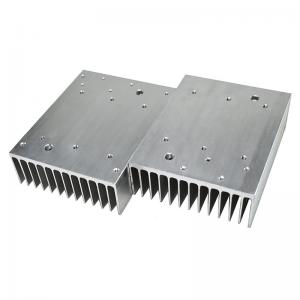1,Is aluminum good for heat sink?
Heat sinks are designed to maximize the surface area in contact
with the coolant fluid.
Aluminum alloys are the most common heat sink material.
This is because aluminum costs less than copper.
However copper is used where higher levels of thermal conductivity
are needed.
If you need heat sink or need design heat sink, you could contact
Fodor Technology, we will offer special service for you.
2.Which heat sink design is best?
Heat sinks are designed using materials that have high thermal
conductivity such as aluminum alloys and copper.
Copper offers excellent thermal conductivity, antimicrobial
resistance, biofouling resistance, corrosion resistance, and heat
absorption
If you need heat sink or need design heat sink, you could contact
Fodor Technology, we will offer special service for you.
3.How does an aluminum heat sink work?
Heat sinks work by redirecting heat flow away from a hot device.
They do this by increasing the device's surface area. In order for
heat sinks to properly work, they must have a temperature higher
than the surroundings to transfer heat
4.Should heat sink be anodized?
Should You Choose Anodized Heat Sinks for Your Project? Anodization
improves the corrosion resistance, wear resistance, and electrical
isolation of a heat sink. It will increase surface emissivity as
well. The increase in emissivity makes a more pronounced difference
in small, passive heat sinks.
5.Does anodized aluminum conduct heat well?
The color of anodization has no impact on radiation heat transfer.
A clear anodized surface has the same emissive characteristics as a
black anodized surface.
6.What is the best material for a heat sink?
Aluminum is the most common material for heat sinks. In particular,
extruded aluminum heat sinks fit the needs of most projects. The
metal is lightweight and has relatively good thermal conductivity.
7.Are all heat sinks made of copper or aluminum?
Are all heat sinks made of copper or aluminum?
As you can see in this table, copper is more conductive than
aluminum. In fact, aluminum only has 60% of the thermal
conductivity that copper does. That's one point for copper.
...
Aluminum vs. Copper: Heat Conductivity.
Metal Thermal Conductivity [BTU/(hr·ft⋅°F)]
Aluminum 136
Copper 231


